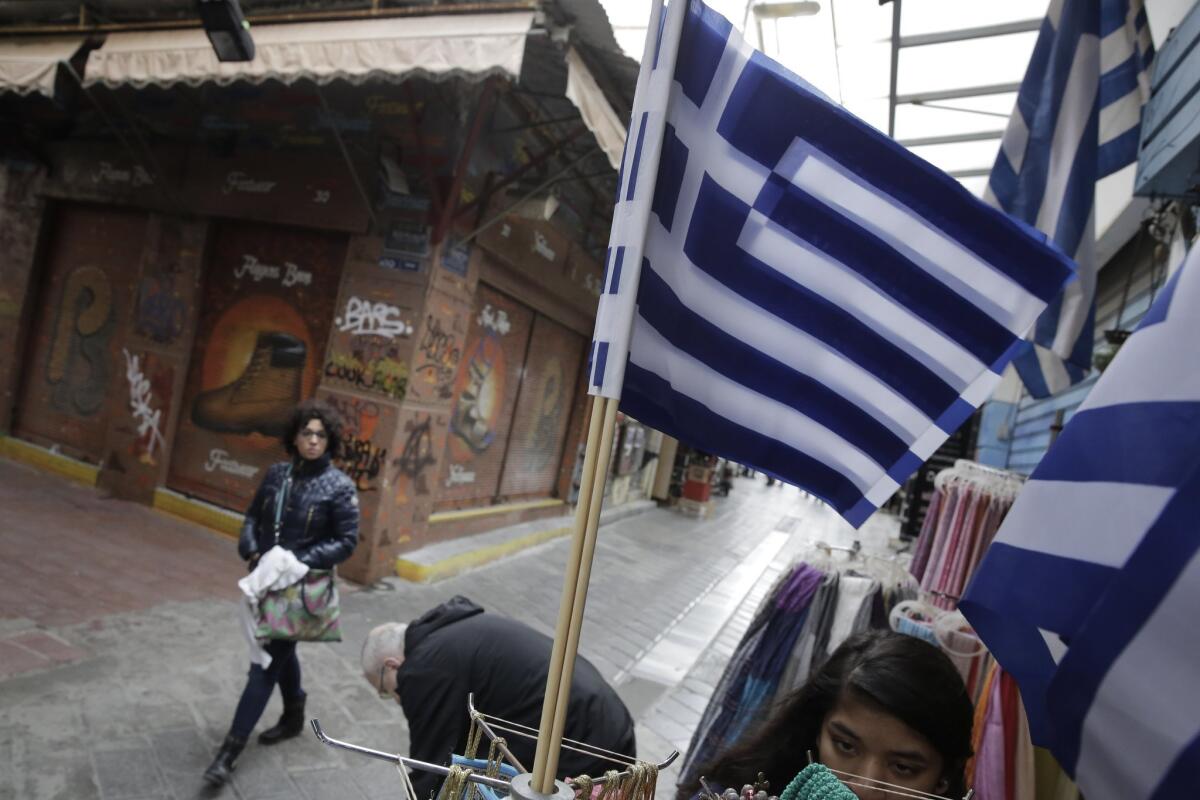Op-Ed: Monetary unity without political unity is pulling Europe apart

- Share via
“If the euro fails, Europe fails.” Thus spake Angela Merkel. Unfortunately, the euro is failing, slowly. Even if Greece “grexits,” the Eurozone seems unlikely to fall apart right away. It is more likely to grind along like a badly designed Kazakh tractor, producing slower growth, fewer jobs and more human suffering than the same countries would experience without monetary union. And the misery will be unevenly distributed between debtor and creditor countries, struggling south and still prospering north.
These different national experiences will be reflected through national elections, creating more tensions of the kind we have already seen between Germany and Greece. Eventually, something will give.
I recently participated in an event in Frankfurt, Germany, attended by representatives of leading European investors. An instant poll was taken: What would the Eurozone look like in five years? Nearly half of those present opted, as I did, for “Japan in the 1990s”; 20% voted for “what Eurozone?”; 18% went for “the UK after [Prime Minister Margaret] Thatcher,” presumably meaning austerity and structural reform producing growth but also dislocation and inequality. The catch is that even in this last, “best” case, the inequality would be unevenly distributed among countries. Germany and a few other North European nations would go on taking most of the gain; others, the pain.
Mainstream German politicians and economists fiercely dispute this analysis. Austerity and structural reform are the one true way to salvation, they insist. As German Chancellor Merkel put it in 2013: “What we have done, everyone else can do.”
There are at least three problems with this. First, even the right medicine can be disastrous if administered in too strong a dose to a weakened patient. Second, Greeks, Italians and French are not Germans. Their economies need structural reforms, but their societies and companies simply do not respond in the same way as Germany’s. Third, even if the whole Eurozone becomes one giant German-style Exportweltmeister, who will be the consumer? Some of the demand must come from richer countries like Germany. If everyone else is to behave more like Germany, then Germany must behave a bit less like Germany. But Germany is not prepared to do that.
In the long term, Germany will suffer from the consequences but not in the short term. Germany has had to bail out countries such as Greece, but much of that money went straight back to imprudent lenders, including German banks. Meanwhile, the German export business has benefited greatly from the Eurozone.
In Frankfurt, the misery of Athens seemed very far away. One German banker said, “The problem with Greece is that they never tried.” This of a country where previously middle-class people go to soup kitchens, half of the younger generation is unemployed and, according to one estimate, since 2008 “spending by Greeks on goods and services has in fact fallen by at least 40%.”
It is not that there is nothing that could be done, if national politics allowed it. Everyone admits in private that Greece cannot repay its mountain of debt, so let Berlin parlay explicit debt forgiveness into continued meaningful reform by the new Greek government. Or agree on fiscal transfers from richer states to poorer ones as in a proper federal union such as the United States, where nobody expects Alabama to perform like Silicon Valley any time soon. But in creating a monetary union without a fiscal or political one, Europeans put the cart before the horse. National democracy therefore stands in a growing tension with European integration.
Let me be clear: Given the choice between democracy and a paternalistic, top-down, Euro-Leninist version of European integration, I would choose democracy every time. The trouble is that the problems of the Eurozone require a transnational European democratic solidarity of fellow-citizens that does not exist and is not in prospect any time soon.
And so the monetary union that was meant to unite Europe pulls it apart. But the torture is slow. In the countries that are suffering most from this “machine from hell,” as one senior German official has described the Eurozone, there is still a passionate determination to stay in Europe. Even Greece has shown a remarkable readiness to compromise.
Domestically, these countries still have the safety net provided by even a much reduced welfare state. Baby boomer parents still have a place for their unemployed children to live, and some life savings to help them out — the Bank of Mama and Papa. The labor mobility guaranteed by the EU also provides a safety valve, as young Spaniards with two university degrees come to work as waiters
in London or Berlin. However, that migration in turn fuels anti-EU political parties that hitch their Euro-skepticism to genuine popular fears about immigration. And gradually these material and cultural reserves will be exhausted.
What then? My heart does not like what my head is telling me. But there is still time to reverse the trend. Can Europe’s ‘89ers — the generation born around and after 1989 — generate the political imagination and will that our current politics are failing to produce?
Timothy Garton Ash is professor of European studies at Oxford University and a senior fellow at the Hoover Institution at Stanford University.
Follow the Opinion section on Twitter @latimesopinion and Facebook
More to Read
Sign up for Essential California
The most important California stories and recommendations in your inbox every morning.
You may occasionally receive promotional content from the Los Angeles Times.













